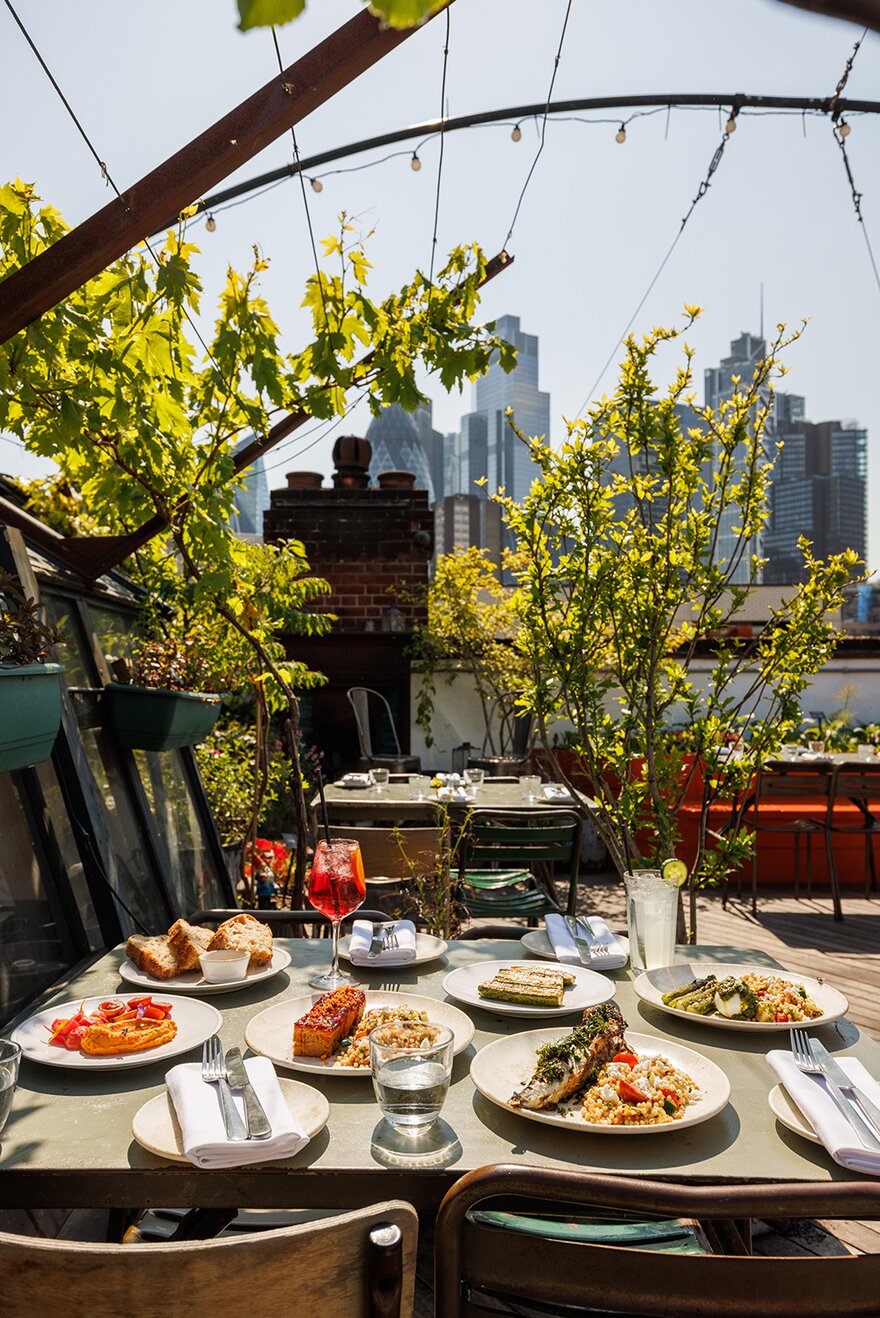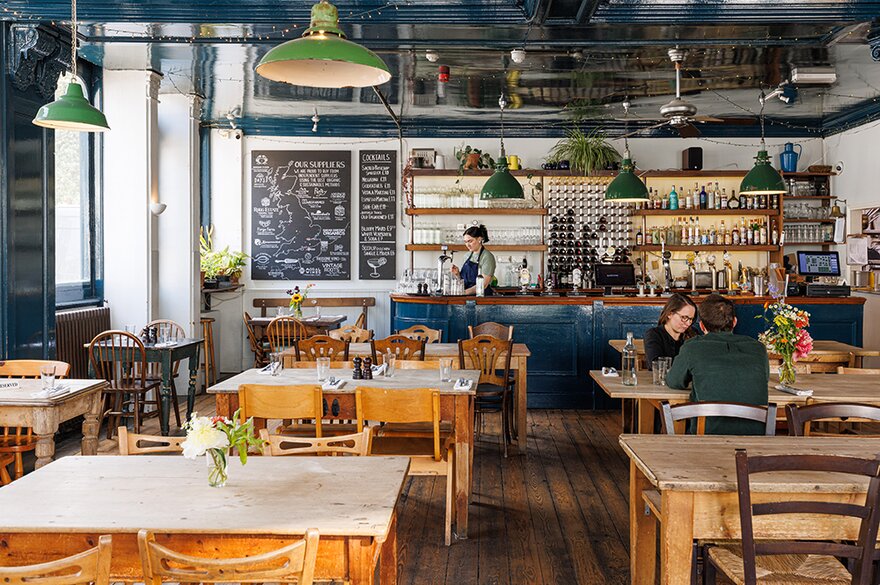The Culpeper Family Hospitality Group has transformed a sterile space into a functioning farm, producing the salads on its diners' plates
Londoners consume some 4.8 million tonnes of food each year, but the city is largely disconnected from the food systems that nourish it, with convenience having become an expectation in both domestic and commercial kitchens.
This separation between produce and plate struck Nico Tréguer, co-founder of the Culpeper Family Hospitality Group, when he arrived in the capital from his native France in 2005, and throughout the group's expansion he and business partner Gareth Roberts have sought ways to recreate this relationship in urban environments.
At their first property, the Culpeper in London's Spitalfields, which opened in 2014, this took the form of a rooftop garden, where guests could dine while surrounded by the garnishes and salads served on their plates. A similar rooftop garden was created at the Buxton bistro and hotel in nearby Brick Lane, where herbs are grown to supplement both dishes and cocktail menus.
Now the group, which also includes the Green in Clerkenwell and Britain's first organically certified pub, the Duke of Cambridge in Islington, has created an urban farm in Deptford, south London, an area better known for its historic dockyards and artistic residents than fertile soil.
Working with grower Jack Astbury, whose company Urban Organic has tended the group's earlier ventures, Tréguer and Roberts have overseen the conversion of a 5,000 sq ft plot of land into a small permaculture farm producing vegetables, fruits, salads and herbs for use across the portfolio.
The partners, business graduate Tréguer and architecturally trained Roberts, acquired the land along with a historic house, which they have restored, in 2020. The pair built more sustainable housing on the site while retaining the remainder of the plot to realise their ambition of bringing their teams and guests closer to food production.
Tréguer says: "We tend to be quite excited by a good use of space. From the very beginning at the Culpeper we had the rooftop, which we used in a small way to grow what we could, but that was always supposed to be a stepping stone while we found more space to increase what we could grow.
"It took us a bit longer than we had envisaged to find grounds with proper soil, but when we took on this site we were very keen to keep this little plot tucked away for a farm that would bring together the teams in the pubs and our neighbours here."
Industrial wasteland to blossoming farm
Turning a patch of land impacted by generations of industrial use and building works into a city oasis is, unsurprisingly, no small feat, but it's one that Astbury and his team at Urban Organic worked towards in an unwavering belief that cities can produce as well as consume food.
Astbury, who began work on site in April, says: "This is a values-based project. We believe food growing should be a part of all our lives and that requires people to put it in around us. Here we are trying to grow food while creating a habitat. In the countryside you have to take down forests to grow food;in a city you're actually creating a habitat while growing food."
When Urban Organic arrived on-site the land had been further compacted by building work, so when they dug they found the soil had a high metal content and many layers that told the history of its use. To prepare the area for growing they had to put down a membrane and add new soil, which Astbury says will improve every year.
"As the land is worked and tended organically, it will become more and more productive," he explains. "That's where the value is. It's so rewarding because you're creating productivity from nothing and there are not that many industries that do that. In a few years' time this whole space will be much greener and everything will be bigger. We'll have more plants, more people and more life."
Transforming the plot into a functioning ecosystem that can promote growth has seen perennial planting, including elder, hazelnut, rowan and wild plum to provide habitats.
Astbury designed the growing area with 80cm beds and 40cm paths laid with woodchip to promote fungal networks in the soil and provide insulation. Two 7,500 litre rain water tanks have also been installed to collect water to irrigate the land, while a greenhouse is already allowing the team to harvest tomatoes (including cherry, red, yellow, San Marzano and beef), a variety of padrón peppers and lots of agretti.
Fruit trees will be planted to the rear of the plot, where there is also a pond that will support drainage and a bank where mushrooms are being grown. There are also plans to create seating areas and install sinks for the use of the team members visiting the farm.
Produce for pubs in the Culpeper Family Hospitality Group
Despite the growers having started work less than six months ago, the land is already providing produce for the pubs, which is delivered across the city by bicycle, and courgettes, tomatoes, herbs, edible flowers and salad have all featured on summer menus.
The produce has been carefully selected for impact and will be adapted as the team learn more about what thrives in the conditions. Peter Weeden, chef director and head of sustainability, says: "We need to be realistic. We're not going to be growing onions, potatoes and carrots. As a group we would consume all the potatoes you could grow in this space every month. The Culpeper alone uses 20-25 bags of potatoes a week and we serve 100,000 meals a year – we can't grow potatoes for that many people, but just having these conversations makes us more conscious of our impact."
Salad items will be the bedrock of the production and the farm will provide at least 50% of what is used in the pubs. The aim of the project is not to be a commercial venture or cost-cutting exercise – though Tréguer expects it to cover its costs operationally – instead it is recognised for its value in communicating the group's culture and providing space and time for the teams to understand food production and be creative.
Tréguer says: "This would not be a good business choice if it was financially driven, but we've created a space that will last a long time so we're not even thinking about that initial investment. There are many other aspects we can measure that make it something that we value, such as our team being happy and staying longer, as well as the guests understanding that when they come to us, they support this to happen."
In recent months rotas have been adapted to schedule time for the wider Culpeper team to spend at the farm tending the crops. Weeden says: "Across every site, both front and back of house have time on the rota, paid for by the company, to come here and that's now part of their working pattern. This is new, but we can already see they're not just bringing back herbs and salads, they're bringing back experiences and the interactions of the day with nature and the natural world, and that's the human value of doing this."
He says the response has been fantastic, with the farm having ignited the creativity of team members, including one chef who returned and made elderflower vinegar, elderflower Champagne and dried elderflowers for use in salads. Weeden adds: "It's been smiles, all smiles. It's people who have done work but don't feel that it was work. Even when they haven't personally visited, to see somebody else so passionate and inspired by three hours on this plot of land picks everyone up."
As well as inspiring creativity Weeden and Tréguer hope that spending time on the farm, helping to develop the site and growing and harvesting produce will give teams a greater understanding of what goes into producing a dish before any ingredients land on a chopping board.
Weeden says: "My big thing at the moment is to change the mindset of chefs who are so used to picking up the phone and doing a second order. If they've been here and they've seen what it actually takes to grow something, they'll understand why placing those expectations on our producers, just so we can be a little less organised, really isn't where we want the food system to go."
First pub in Britain to be certified as organic
Weeden joined the Culpeper group in 2019 when it took on the Duke of Cambridge in Islington, where he was head chef. The Duke was the first pub in Britain to be certified as organic by the Soil Association and he had been at the forefront of the project under previous owner Riverford.
Working under the constraints of an organic-only kitchen that uses solely British produce has given him an understanding of the realities of production. He says: "Part of that journey was understanding just how difficult it is to get produce 12 months of the year. To the point that one year Giti [Singh, the pub's founder] said ‘when the vegetables run out, we won't have vegetables to sell and we'll have to tell people we don't have any vegetables'.
"That's because the hunger gap is a real thing. Finding really well-grown produce is always a challenge and we don't have the food security to provide fresh produce 12 months of the year. We love having organic status at the Duke but we have to restrict what we do and work with what's being produced. That's real and anything guaranteed for 12 months of the year is not real."
The creation of the farm is, of course, a wonderful thing to be able to share with guests, but both Weeden and Tréguer explain that the messaging around the reasons for pursuing the product need to be communicated in a positive way.
"First and foremost we want to prove it's possible," says Tréguer. "We're in a fun industry and it's a very serious subject that can be quite gloom and doom. We can't be about shame and guilt – we want to show that it's possible and inspire."
In just six months the farm has proved that fantastic produce can be grown in a city using organic methods and the team are already eyeing up new plots to expand production.
Tréguer adds: "I think it's unlikely we'll have a countryside-size field anywhere in London, but a collection of small plots is very real possibility and that's where we want it to go."
The Culpeper Hospitality Group
The Culpeper Spitalfields pub with first-floor restaurant, five hotel bedrooms and a rooftop garden and greenhouse.
The Buxton Brick Lane bistro and hotel with 15 bedrooms and a rooftop for hotel guests.
The Green Clerkenwell pub with events space.
The Duke of Cambridge Britain's first organic pub/restaurant, based in Islington.
Tomato butter sauce recipe
By Peter Weeden, chef director and head of sustainability
This is my take on a recipe my head chef Michael Weiss taught me many years ago.
It's essentially a tomato beurre blanc and is just so delicious.
- 2 cloves garlic
- 100ml cider vinegar
- 100g shallot, diced
- 100ml white wine
- 1tsp tomato purée
- 100g split tomatoes, oven-dried overnight at 55°C
- Dash of cream (optional)
- 250g cold salted butter, diced
- 250g tomatoes, freshly chopped into chunks
- ½ cup spring onions, sliced
- Tarragon, chopped
Place the garlic, vinegar and shallots in a saucepan and bring to the boil. Reduce by half and then add the wine. Reduce by half again and then add the tomato purée and dried tomatoes. Simmer gently for five minutes.
Add a dash of cream and then add the butter, whisking in a couple of cubes at a time over a low heat so the sauce doesn't split.
Once all the butter has been incorporated and the sauce is hot but not boiling, add the fresh tomatoes, spring onions and tarragon. Taste and check the seasoning – a turn of pepper can just give it a lift. I would recommend serving with whole grilled red mullet, pollack or even mackerel.
Continue reading
You need to be a premium member to view this. Subscribe from just 99p per week.
Already subscribed? Log In












